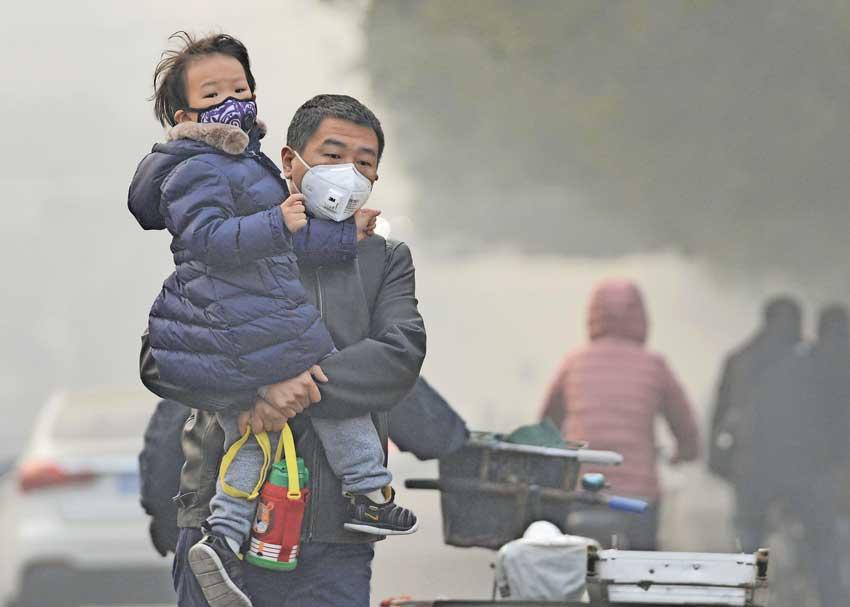Reply To:
Name - Reply Comment
Last Updated : 2024-04-24 11:56:00

 We all love our children and go to great lengths to ensure that they live healthy and successful lives. We as responsible parents keep a keen eye on what children eat and drink and their nutritional value. But unfortunately we fail to grasp the importance of the quality of air we and our children breathe.
We all love our children and go to great lengths to ensure that they live healthy and successful lives. We as responsible parents keep a keen eye on what children eat and drink and their nutritional value. But unfortunately we fail to grasp the importance of the quality of air we and our children breathe.
Recent data released by the World Health Organization (WHO) show that air pollution has a terrible impact on child health and survival. Accordingly, air pollution contributes to respiratory tract infections that resulted in 543 000 deaths in children under the age of 5 years in 2016. Globally, 93% of all children live in environments with air pollution levels above the WHO guidelines.
Highlighting the importance of the quality of the air we breathe, Consultant Pulmonologist Dr. Neranjan Dissanayake (MBBS MD (Medicine) MRCP (UK) FCCP (SL) FRCP (London)) points out that while an average adult eats about one kilogram of food and drinks 2 litres of water per day he or she breathes 10,000 litres of air during that time. Moreover, while we can control what we eat and drink, we might not be able to hold our breath, even in circumstances where we know that breathing will be harmful.
Quality of air
Dr. Dissanayake defines air pollution as the presence of harmful substances in the atmosphere that may cause detrimental health effects to humans, animals and the planet. While these harmful substances can be emitted to the atmosphere through natural phenomena, such as eruption of volcanos, wild fires, pollination and natural decay, air pollution is mostly resulted by human activity, mainly by the combustion of fuel.
Harmful substances such as ground level ozone (O3), oxides of Nitrogen and Sulphur, Volatile Organic Compounds (VOC) such as formaldehyde and other hydrocarbons and some are complex minute particles (particulate matter- PM) containing traces of metal, organic substances or carbon. Due to its very small size, these harmful particles may be able to reach not only the lining of the inner most lung, but the blood stream as well, passing though the protective linings of organs.
Air Quality Index (AQI) is an indicator on air quality which gives an idea about the immediate harmful health effects, using a score from 0 to 500, and graded according to a color scheme; Green (good), Yellow (moderate), Orange (unhealthy for sensitive groups), Red (unhealthy), Purple (very unhealthy) and Red/Brown (Hazardous). On December 20 this year, the AQI in Colombo was recorded as 142, and is defined Orange, meaning that it will be detrimental to sensitive people, such as people having asthma and other lung diseases.
Potential Health Risks
According to Dr. Dissanayake, concentration of such harmful substances not only will have immediate health effects, such as triggering asthma attacks, cough breathing difficulties, it will have long term health consequences, especially in children, affecting their wellbeing.
“It is important to note that most of our schools with more than thousand children are situated in towns, and adjacent to major, busy and congested roads. They are exposed to peak traffic hours while in school. The long term effects on their respiratory health, growth and wellbeing should raise serious concerns,” he emphasised.
According to him, in Sri Lanka, there are two main monitoring stations in Battaramulla and Kandy that measures, fine particles (PM2.5), coarse particles (PM10), Sulphur Dioxide (SO2), Nitrogen Dioxide (NO2), atmospheric Ozone (O3) and Carbon Monoxide (CO) on a regular basis. However, this does not account for the air pollution of indoors such as in our houses and work places. One such major indoor pollutant is cigarette smoke. Thousands of children, women and sometimes unborn children are exposed to cigarette smoke in Sri Lanka because of the smoking habits of their fathers or partners.
This has major health effects to the unborn, causing birth defects, low birth weight (32% more probable compared to non-exposed), and detrimental effect to the growth of the lungs, that may predispose them to have frequent respiratory illness such as asthma (25% more probable) and develop chronic illnesses such as Chronic Obstructive Pulmonary Disease (COPD).
Another major indoor air pollutant is the burning of wood for cooking. The WHO states that it is the third commonest cause in children, to cause reduction of quality of life. It predisposes children to recurrent respiratory infections and poor lung growth. In addition, poorly kept indoor environments facilitates the growth of molds and various insects, such as cockroaches, dust mites, etc. Dust mites are one of the common source for various allergens in Sri Lanka that can trigger asthma and runny noses in sensitive people. Simple measures of good housekeeping may mitigates these effects.
Minimising the risks
“It is important that we, as adults, while being concerned about our health, have a clear and conscience plan to mitigate the impact of poor air quality, both outdoors as well as indoors,” Dr. Dissanayake explained.
Improving on the air quality monitoring systems both outdoors as well as indoors which would facilitate identifying the sources and taking remedial action, going towards non-fossil based fuels for energy requirements, improving indoor air quality by frequent reminders on the harmful effects of passive smoking and bio mass fuel exposure, etc. might be some aspects that we as a country could act on in order to mitigate the harmful effects of this pandemic, that is not seen or felt, but is surely affecting the wellbeing of our children.
“Air Pollution is stunting our children’s brains, affecting their health in more ways than we suspected. But there are many straight-forward ways to reduce emissions of dangerous pollutants,” Dr. Maria Neira, Director, Department of Public Health, Environmental and Social Determinants of Health at the WHO said.

Add comment
Comments will be edited (grammar, spelling and slang) and authorized at the discretion of Daily Mirror online. The website also has the right not to publish selected comments.
Reply To:
Name - Reply Comment
US authorities are currently reviewing the manifest of every cargo aboard MV
On March 26, a couple arriving from Thailand was arrested with 88 live animal
According to villagers from Naula-Moragolla out of 105 families 80 can afford
Is the situation in Sri Lanka so grim that locals harbour hope that they coul